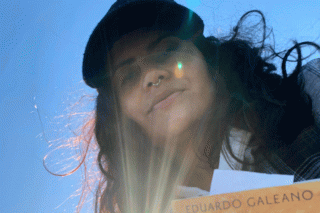As the Student Equity & Outreach Librarian at Mt. San Antonio College, a community college in Walnut, California, Eva Rios-Alvarado ’14MS wants students to know that the library is for everyone.
“My job is to share what the library is and empower people to use it for their education and personal lives,” says Rios-Alvarado. “Many students, staff, and faculty do not feel comfortable and engaged with libraries as spaces of learning, collaboration, and joy. My goal is to reframe how libraries in community college can be centers for political and social community building, creativity boosters, and personal development for the individual and their family.”
The relationships she builds with students are vital. Rios-Alvarado is engaged in outreach, encouraging everyone to attend workshops at the library and develop a personal sense of agency with any library service and resource. She also partners with equity programs on campus to showcase the library, network, and building community.
“Different people told me that they had never seen or thought of the library before I came to campus — they didn’t know about it,” explains Rios-Alvarado. “We have to start by making sure people feel welcomed and safe to be engaged and attune to the possibilities fully.”
Rios-Alvarado was previously an adviser to clubs on campus, including MECHA (Chicanx Student Movement of Aztlán) and the Parents in College Club. “Students would come to the library to have meetings, do research, and just check in with me. I noticed students would come more to the library once I was engaged in what students cared about.”
During the pandemic, this work becomes more challenging and more important. “Librarians at Mt. SAC want people to know that the library is for everyone, offering wrap-around support for students’ research needs and information needs, in classes and in their personal lives.” Right now, the campus is closed, but the library is accessible 24/7 online, offering access to databases and other services.
My job is to share what the library is and empower people to use it for their education and personal lives.
For the past three years, Rios-Alvarado has also led librarians in collaboration with an art history professor to hold ART+FEMINISM Wikipedia Edit-a-thons, a series of events on how to edit Wikipedia to increase the number of female artists to increase gender diversity and representation in Wikipedia.
“Students learn to do library research to support their edits and add to the global campaign of Art+Feminism in the process,” she says. “The project pulls together equity, outreach, and instruction. It allows me to teach information literacy, along with the gender invisibility component.”
The college received a grant from the Wikimedia Foundation, based on their proposed work for 2021 events and educational activities for art history classes and Rios-Alvarado’s library class. They have also engaged campus programs to bring in more student editors, Womxn’s Empowerment and the Pride Center, to join the Edit-a-thons.
In collaboration with Amanda Leftwich, Student Success Librarian at Montgomery County Community College, Rios-Alvarado also aims to champion the importance of BIPOC community college librarians in an upcoming book, to be published by Litwin Books.
“Amanda and I felt it was an important addition to Litwin’s Critical Race series,” she says. “There aren’t many books about the community college library from a BIPOC perspective, and it’s a necessary addition to the body of literature.”
The contributions of BIPOC librarians and library workers are important and provide context to the work being done within the post-secondary education landscape. “We want our work to be a part of LIS history. We want people to know what we’re doing, the projects we do, and the advocacy and information literacy that we do in our vein of librarianship. People should know about our lives, work, and how we support and lead in our communities.”
At Simmons, Rios-Alvarado learned how to be a part of her program and department, even while living in Dorchester. “I was able to navigate my academic needs, and if I needed support, I could speak to a faculty member.”
Adjunct Professor Michael Leach opened her eyes to different skills she needed to develop and supported her creative approach to the coursework. “Students need to advocate for their needs — curriculum, policy, or any services that are missing for our success.”
Networking and finding potential mentors along the way are also important. “Networking and building community keep you in the loop for future collaborations. Build a community and network with people that you can reach out to if you need help or expertise. I’m still in contact with dear friends from my time at Simmons, including Renee Neely, Leticia Ramos, and Nicole Prawl, Falah Rashid. All these people made up a network of care and support that got me through grad school.”
When she schedules panel discussions for her information literacy classes, she taps into that network. “I can invite specialists in different areas because I know them! I can invite them myself and not rely on someone else.”
Connect to Eva Rios-Alvarado via LinkedIn.

